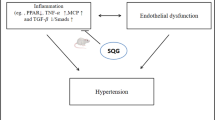Abstract
Objective
To observe the effect of Chinese herbal medicine for calming Gan (肝) and suppressing hyperactive yang (平肝潜阳, CGSHY) on arterial elasticity function and the circadian rhythm of blood pressure in patients with essential hypertension (EH).
Methods
Adopting a parallel, randomized design, sixty-four patients with EH of stages I and II were randomly divided into two groups according to a random number table, with 32 in each group. The patients in the treatment group were treated with CGSHY and those in the control group were treated with Enalapril. All patients were given 24-h ambulatory blood pressure monitoring (ABPM) before and after a 12-week treatment. Trough/peak (T/P) ratios of systolic and diastolic blood pressure (SBP & DBP) of each group were calculated. The circadian rhythm of their blood pressure was observed at the same time. The changes in elasticity of the carotid artery in the patients, including stiffness parameter (β), pressure-strain elastic modulus (Ep), arterial compliance (AC), augmentation index (AI), and pulse wave velocity (PVWβ) were determined by the echo-tracking technique before and after a 12-week treatment. In the meantime, their levels of nitric oxide (NO) and endothelin-1 (ET-1) were measured respectively.
Results
After treatment, all parameters in the 24-h ABPM and the elasticity of the carotid artery (β, Ep, AC and PVWβ) were markedly improved, the level of NO was increased, and ET-1 was decreased in both groups as compared with values before treatment (P<0.05 or P<0.01). Further, the improvements in the ratio of T/P of SBP & DBP and in the level of NO and ET-1 in the treatment group were more signifificant than those in the control group (P<0.05). There were no signifificant differences in all parameters in the ABPM monitoring and the elasticity of the carotid artery, the recovery of blood pressure circadian rhythm, and the therapeutic effect of antihypertension in EH patients between the two groups (P>0.05).
Conclusions
Chinese herbal medicine for CGSHY may lower the blood pressure smoothly and recover the circadian rhythm of blood pressure in EH patients. They may also improve the carotid elasticity of EH patients similar to that of Enalapril. The mechanism of action of Chinese herbs on EH might be related to the regulation of vascular endothelium function.
Similar content being viewed by others
References
Mancia G, De Backer G, Dominiczak A, Cifkova R, Fagard R, Germano G, et al. 2007 guidelines for the management of arterial hypertension: the task force for the management of arterial hypertension of the European Society of Hypertension (ESH) and of the European Society of Cardiology (ESC). J Hypertens 2007;25:1105–1187.
Mancia G, Parati G. Ambulatory blood pressure monitoring and organ damage. Hypertension 2000;36:894–900.
Zhong GW, Li W, Luo YH, Chen GL, Yi ZJ, Chen ZQ, et al. Effect of calming the liver and suppressing the hyperactive yang drugs on lymphocyte protein in hypertension patients with hyperactivity of liver yang. J Cent South Univ (Med Sci, Chin) 2008;33:1005–1011.
Zhong GW, Luo YH, Xiang LL, Xie Y, Xie QY, Li YH, et al. Clinical efficacy study on calming liver and restraining yang formula in treating patients with mild or moderate degree of essential hypertension. China J Chin Mater Med (Chin) 2010;35:776–781.
Guan DM, Qi YQ, Wang XH. Study of evaluating effects of decreasing blood pressure drug with trough peak ratio. J Harbin Med Univ (Chin) 2002;36:466–467.
Clark R, Benkert RA, Flack JM. Large arterial elasticity varies as a function of gender and racism-related vigilance in black youth. J Adolscent Health 2006;39:562–569.
Ministry of Health, P. R. China. Guiding principle of clinical research on new drugs of traditional Chinese medicine. Beijing: China Medical Science and Technology Press; 2002:73–77.
Zieman SJ, Melenovsky V, Kass DA. Mechanisms, pathophysiology, and therapy of arterial stiffness. Arterioscler Thromb Vasc Biol 2005;25:932–943.
Chobanian AV, Bakris GL, Black HR, Cushman WC, Green LA, Izzo JL Jr, et al. Seventh report of the Joint National Committee on prevention, detection, evaluation, and treatment of high blood pressure. Hypertension 2003;42:1206–1252.
Williams B, Lacy PS, Thom SM, Cruickshank K, Stanton A, Collier D, et al. Differential impact of blood pressurelowering drugs on central aortic pressure and clinical outcomes: principal results of the Conduit Artery Function Evaluation (CAFE) Study. Circulation 2006;113:1213–1225.
Gosse P, Lasserre R, Minifié C, Lemetayer P, Clementy J. Arterial stiffness evaluated by measurement of the QKD interval is an independent predictor of cardiovascular events. Am J Hypertens 2005;18:470–476.
Chai GX, Zhu KJ, Han YM, Sun HL. The common of syndrome in hypertensive disease observed by clinical epidemiology. J Tradit Chin Med (Chin) 1999;40:492–493.
Author information
Authors and Affiliations
Corresponding author
Additional information
Supported by the National Natural Science Foundation of China (No. 30500644; 304071125) and the Science and Technology Projects of Traditional Chinese Medicine of Hunan Province (No. 2009047)
Rights and permissions
About this article
Cite this article
Zhong, Gw., Chen, Mj., Luo, Yh. et al. Effect of chinese herbal medicine for calming Gan (肝) and suppressing hyperactive yang on arterial elasticity function and circadian rhythm of blood pressure in patients with essential hypertension. Chin. J. Integr. Med. 17, 414–420 (2011). https://doi.org/10.1007/s11655-011-0761-6
Received:
Published:
Issue Date:
DOI: https://doi.org/10.1007/s11655-011-0761-6




